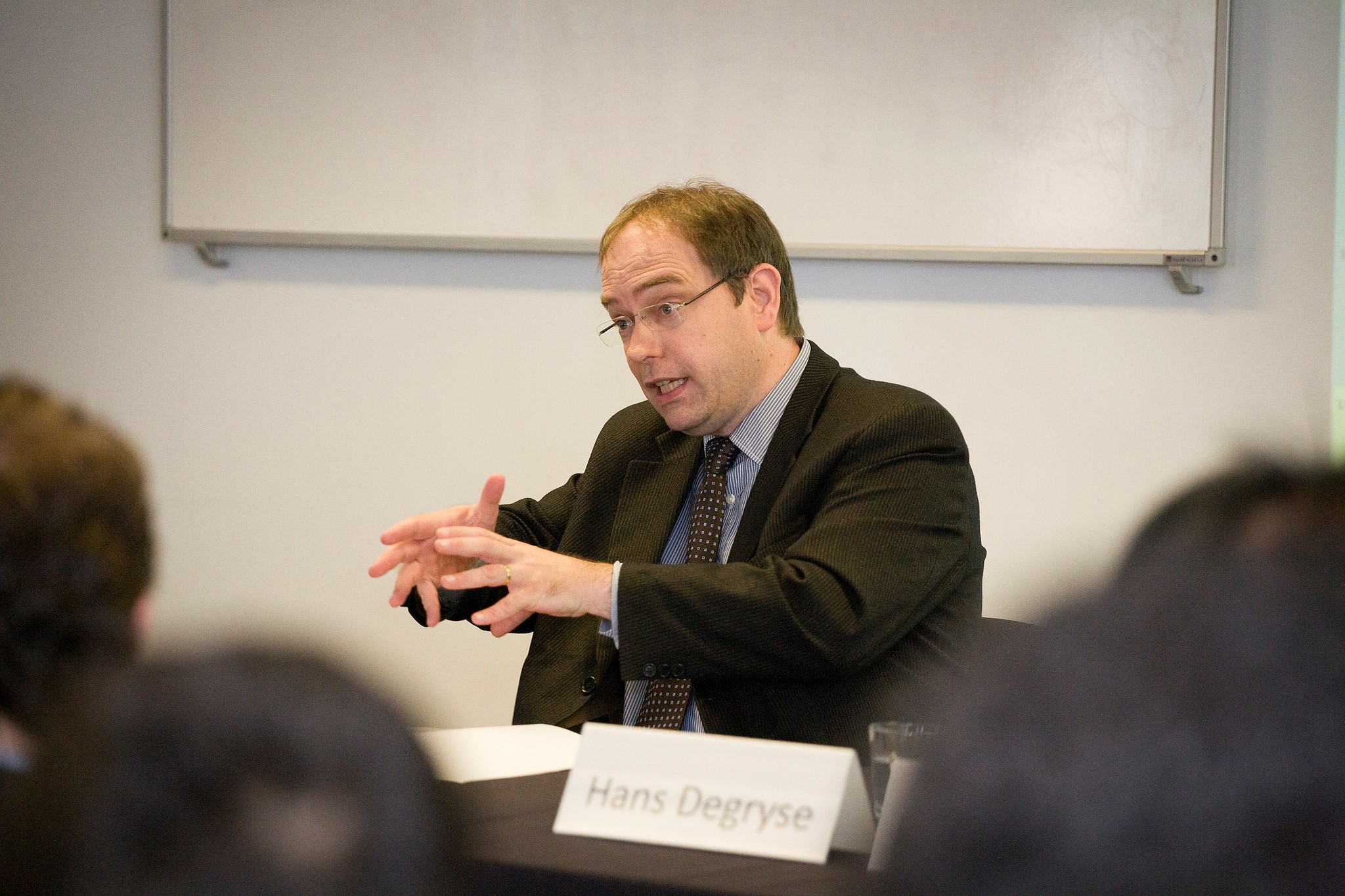Anpassungsfähigkeit und Resilienz des Finanzsystems
Diese Forschungsgruppe untersucht kritische Aspekte der Anpassungsfähigkeit und Widerstandsfähigkeit von Finanzsystemen. Sie analysiert die Auswirkungen von Naturkatastrophen auf Finanzsysteme, die Auswirkungen politischer Präferenzen für die grüne Transformation und die Bedeutung von Kultur in den Volkswirtschaften.
Forschungscluster
Finanzresilienz und RegulierungIhr Kontakt

- Abteilung Finanzmärkte
PROJEKTE
08.2022 ‐ 07.2025
OVERHANG: Schuldenüberhang und grüne Investitionen – die Rolle von Banken für den klimafreundlichen Umgang mit emissionsintensiven Anlagenvermögen
Bundesministerium für Bildung und Forschung (BMBF)
Ziel von OVERHANG ist es, die Rolle von Banken für den klimafreundlichen Umgang mit emissionsintensiven Anlagevermögen zu untersuchen. Hierdurch sollen politikrelevante Erkenntnisse zu Finanzregulierung, staatlich kontrollierter Kreditvergabe und Finanzstabilität identifiziert sowie eine Sensibilisierung der verschuldeten Akteurinnen und Akteuren erreicht werden.
Das Projekt wird vom Bundesministerium für Bildung und Forschung (BMBF) finanziert.
01.2015 ‐ 12.2019
Interactions between Bank-specific Risk and Macroeconomic Performance
Deutsche Forschungsgemeinschaft (DFG)
07.2016 ‐ 12.2018
Relationship Lenders and Unorthodox Monetary Policy: Investment, Employment, and Resource Reallocation Effects
Leibniz-Gemeinschaft
We combine a number of unique and proprietary data sources to measure the impact of relationship lenders and unconventional monetary policy during and after the European sovereign debt crisis on the real economy. Establishing systematic links between different research data centers (Forschungsdatenzentren, FDZ) and central banks with detailed micro-level information on both financial and real activity is the stand-alone proposition of our proposal. The main objective is to permit the identification of causal effects, or their absence, regarding which policies were conducive to mitigate financial shocks and stimulate real economic activities, such as employment, investment, or the closure of plants.
Referierte Publikationen

On the Incentives to Provide Fuel-Efficient Automobiles
in: Journal of Economics, Nr. 2, 2001
Abstract
We argue that the provision of more fuel-efficient cars necessitates specific aerodynamic shapes. We show that the presence of this technological constraint may reduce the incentives to provide fuel efficiency. In equilibrium, cars become more similar and aerodynamic as fuel prices increase. However, the provided level of fuel efficiency falls short of the social optimal one such that a fuel-economy standard is welfare-enhancing.

Bank Relationships and Firm Profitability
in: Financial Management, Nr. 1, 2001
Abstract
This paper examines how bank relationships affect firm performance. An empirical implication of recent theoretical models is that firms maintaining multiple bank relationships are less profitable than their single-bank peers. We investigate this empirical implication using a data set containing virtually all Norwegian publicly listed firms for the period 1979-1995. We find that profitability is substantially higher if firms maintain only a single bank relationship. We also find that firms replacing a single bank relationship are on average smaller and younger than firms not replacing a single bank relationship.

Price Competition between an Expert and a Non-Expert
in: International Journal of Industrial Organization, Nr. 6, 2000
Abstract
This paper characterizes price competition between an expert and a non-expert. In contrast with the expert, the non-expert's repair technology is not always successful. Consumers visit the expert after experiencing an unsuccessful match at the non-expert. This re-entry affects the behavior of both sellers. For low enough probability of successful repair at the non-expert, all consumers first visit the non-expert, and a 'timid-pricing' equilibrium results. If the non-expert's repair technology performs well enough, it pays for some consumers to disregard the non-expert a visit. They directly go to the expert's shop, and an 'aggressive-pricing' equilibrium pops up. For intermediate values of the non-expert's successful repair a 'mixed-pricing' equilibrium emerges where the expert randomizes over the monopoly price and some lower price.

The Total Cost of Trading Belgian Shares: Brussels versus London
in: Journal of Banking and Finance, Nr. 9, 1999
Abstract
Since 1990, London’s SEAQ International (SEAQ-I) has attracted considerable trading volume in Belgian equities. This paper investigates competition between the Brussels CATS market and London’s SEAQ-I. Toward this end, we gathered extensive limit order book data as well as transactions and quotation information. With regard to liquidity (indirect costs), measured by the quoted and effective bid–ask spread, the paper concludes that CATS outperforms SEAQ International for both measures. The effective spread is of course substantially smaller than the quoted spread, with the CATS effective spread showing a U-shaped form. This paper, unique in employing an extensive data set that includes all hidden orders and the whole limit order book, produces results in line with the different market microstructure models. Total trading costs on CATS are lower (higher) for small (large) trade sizes.

On the Interaction between Vertical and Horizontal Product Differentiation: An Application to Banking
in: Journal of Industrial Economics, Nr. 2, 1996
Publikation lesenArbeitspapiere
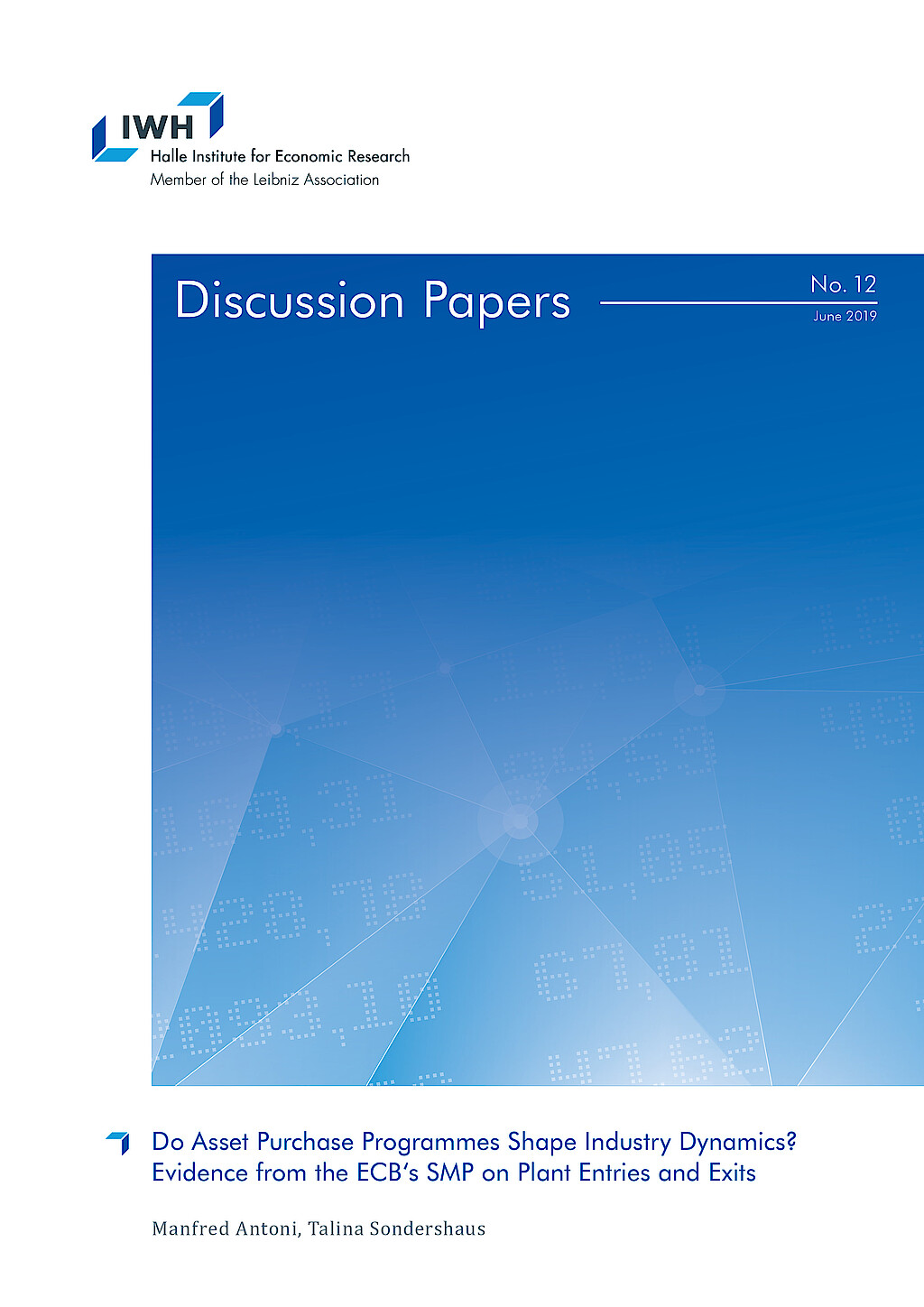
Do Asset Purchase Programmes Shape Industry Dynamics? Evidence from the ECB's SMP on Plant Entries and Exits
in: IWH Discussion Papers, Nr. 12, 2019
Abstract
Asset purchase programmes (APPs) may insulate banks from having to terminate relationships with unproductive customers. Using administrative plant and bank data, we test whether APPs impinge on industry dynamics in terms of plant entry and exit. Plants in Germany connected to banks with access to an APP are approximately 20% less likely to exit. In particular, unproductive plants connected to weak banks with APP access are less likely to close. Aggregate entry and exit rates in regional markets with high APP exposures are also lower. Thus, APPs seem to subdue Schumpeterian cleansing mechanisms, which may hamper factor reallocation and aggregate productivity growth.
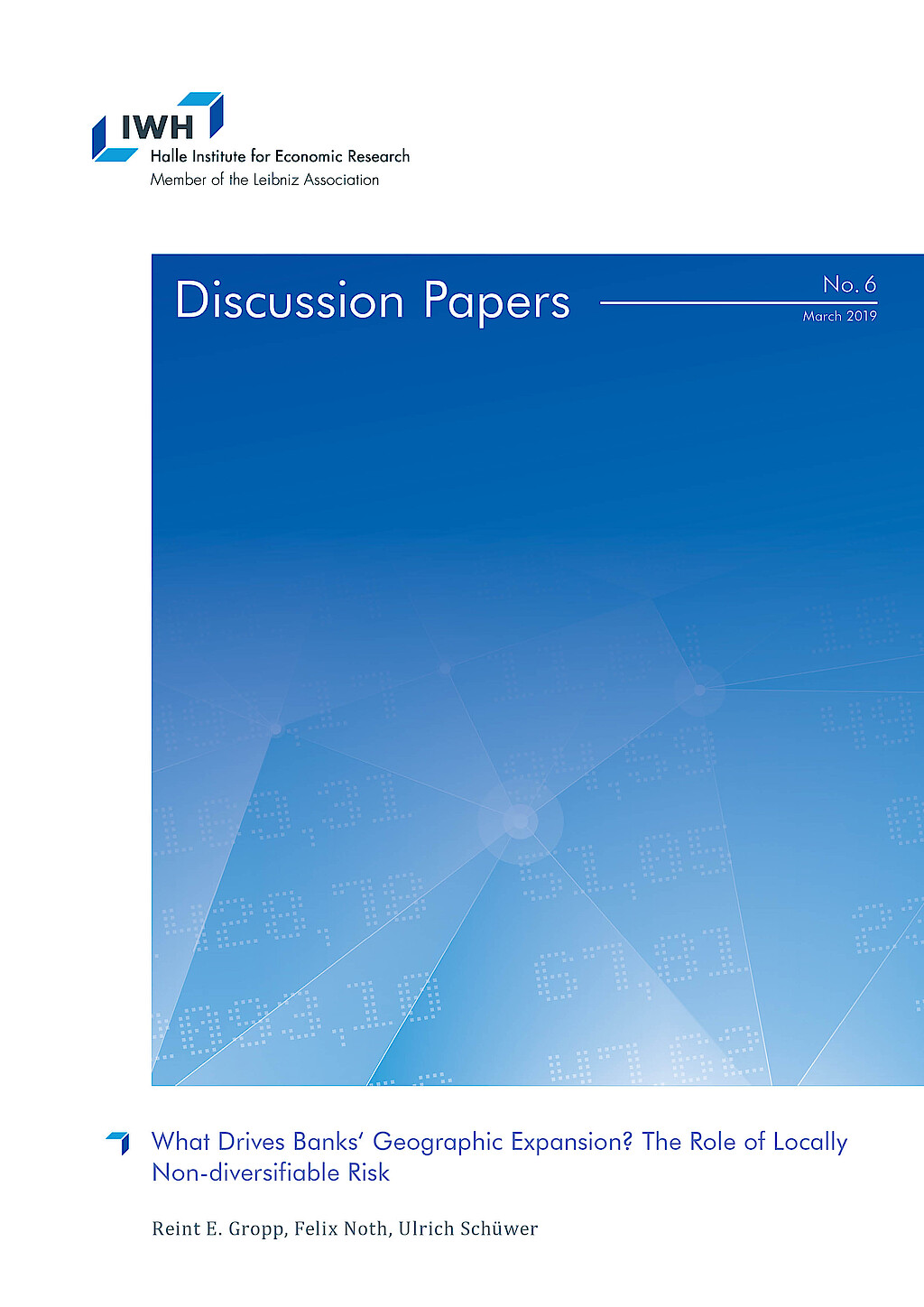
What Drives Banks‘ Geographic Expansion? The Role of Locally Non-diversifiable Risk
in: IWH Discussion Papers, Nr. 6, 2019
Abstract
We show that banks that are facing relatively high locally non-diversifiable risks in their home region expand more across states than banks that do not face such risks following branching deregulation in the 1990s and 2000s. These banks with high locally non-diversifiable risks also benefit relatively more from deregulation in terms of higher bank stability. Further, these banks expand more into counties where risks are relatively high and positively correlated with risks in their home region, suggesting that they do not only diversify but also build on their expertise in local risks when they expand into new regions.
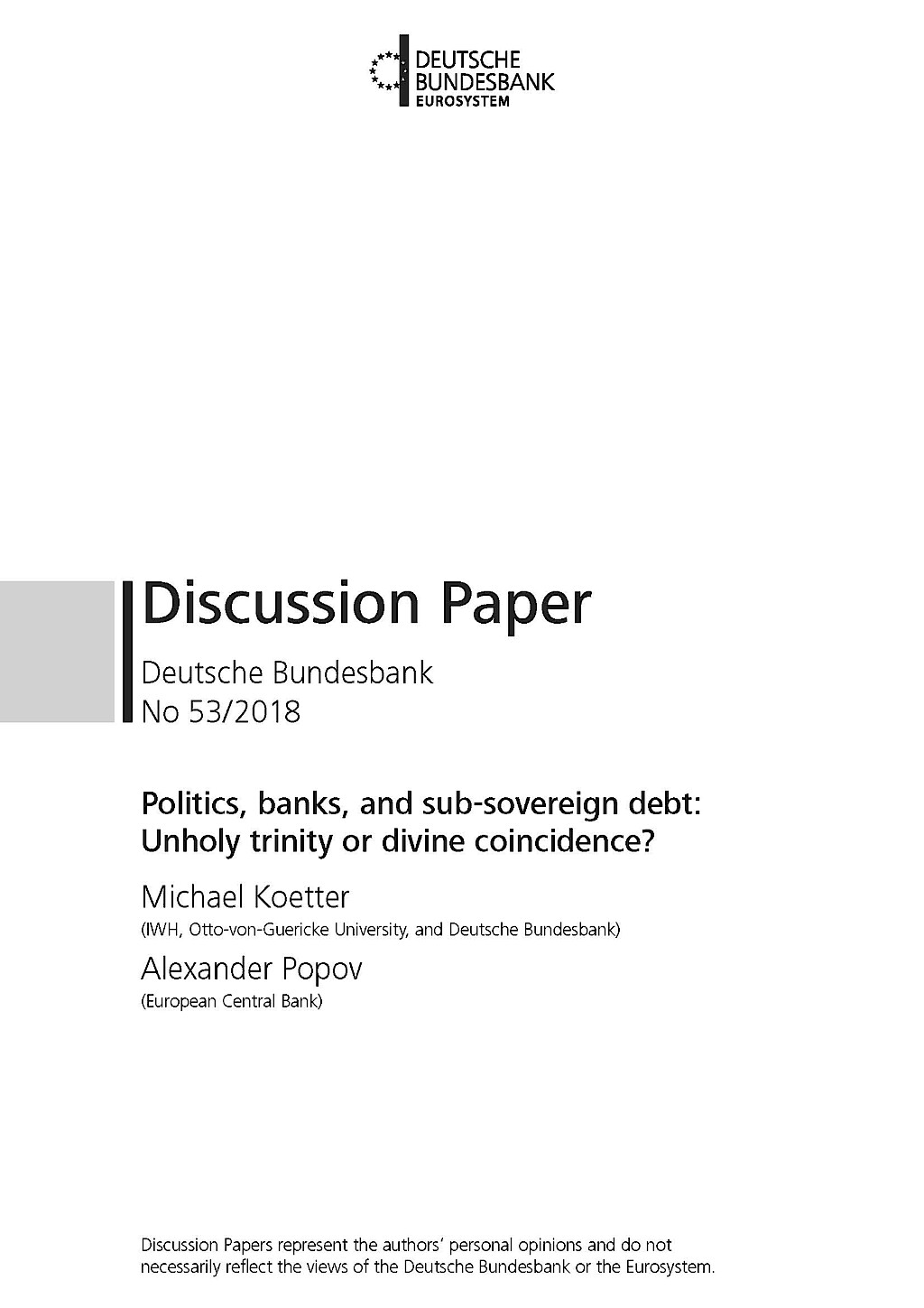
Politics, Banks, and Sub-sovereign Debt: Unholy Trinity or Divine Coincidence?
in: Deutsche Bundesbank Discussion Paper, Nr. 53, 2018
Abstract
We exploit election-driven turnover in State and local governments in Germany to study how banks adjust their securities portfolios in response to the loss of political connections. We find that local savings banks, which are owned by their host county and supervised by local politicians, increase significantly their holdings of home-State sovereign bonds when the local government and the State government are dominated by different political parties. Banks' holdings of other securities, like federal bonds, bonds issued by other States, or stocks, are not affected by election outcomes. We argue that banks use sub-sovereign bond purchases to gain access to politically distant government authorities.
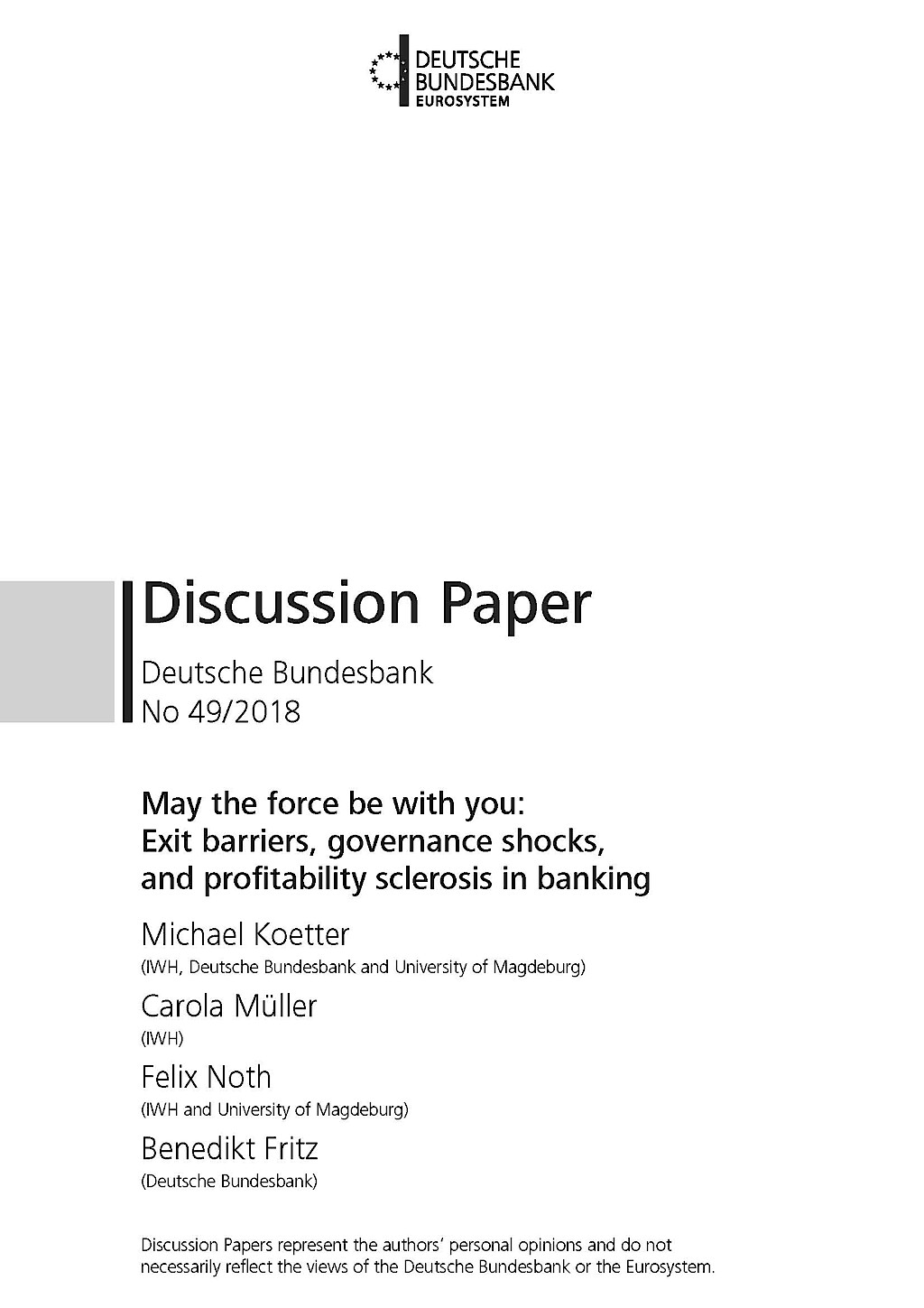
May the Force Be with You: Exit Barriers, Governance Shocks, and Profitability Sclerosis in Banking
in: Deutsche Bundesbank Discussion Paper, Nr. 49, 2018
Abstract
We test whether limited market discipline imposes exit barriers and poor profitability in banking. We exploit an exogenous shock to the governance of government-owned banks: the unification of counties. County mergers lead to enforced government-owned bank mergers. We compare forced to voluntary bank exits and show that the former cause better bank profitability and efficiency at the expense of riskier financial profiles. Regarding real effects, firms exposed to forced bank mergers borrow more at lower cost, increase investment, and exhibit higher employment. Thus, reduced exit frictions in banking seem to unleash the economic potential of both banks and firms.
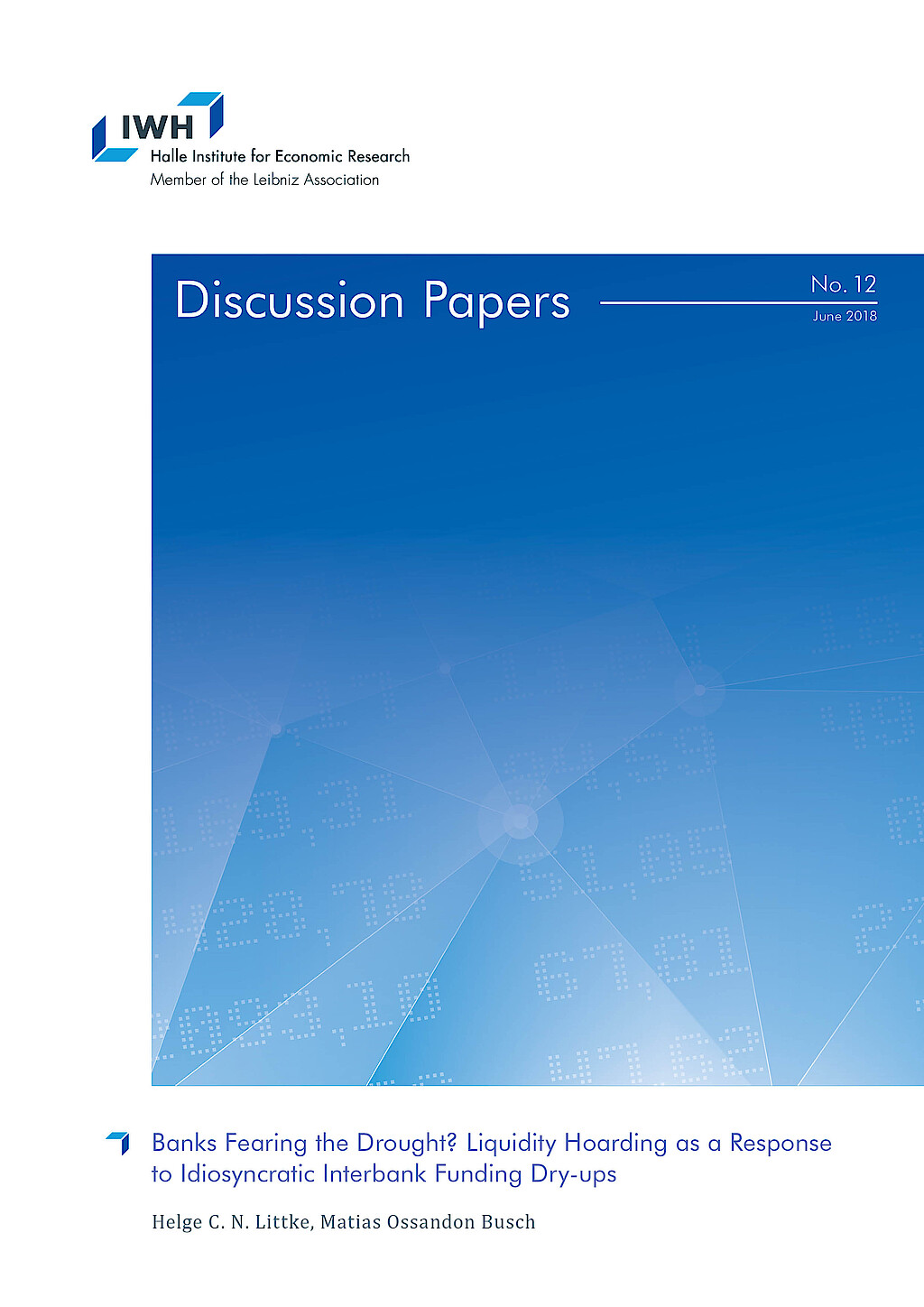
Banks Fearing the Drought? Liquidity Hoarding as a Response to Idiosyncratic Interbank Funding Dry-ups
in: IWH Discussion Papers, Nr. 12, 2018
Abstract
Since the global financial crisis, economic literature has highlighted banks’ inclination to bolster up their liquid asset positions once the aggregate interbank funding market experiences a dry-up. To this regard, we show that liquidity hoarding and its detrimental effects on credit can also be triggered by idiosyncratic, i.e. bankspecific, interbank funding shocks with implications for monetary policy. Combining a unique data set of the Brazilian banking sector with a novel identification strategy enables us to overcome previous limitations for studying this phenomenon as a bankspecific event. This strategy further helps us to analyse how disruptions in the bank headquarters’ interbank market can lead to liquidity and lending adjustments at the regional bank branch level. From the perspective of the policy maker, understanding this market-to-market spillover effect is important as local bank branch markets are characterised by market concentration and relationship lending.



